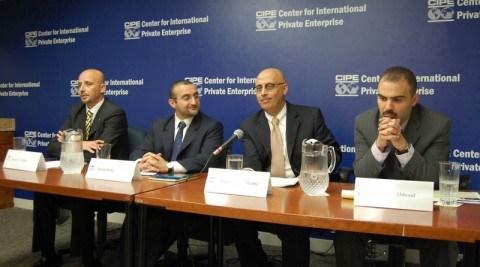
In a previous blog post, I presented some of the harsh economic realities of today’s Syria and highlighted the work that the Syrian Economic Forum (SEF) is doing to create a better future. On April 18, CIPE hosted a panel discussion on the “Role of the Private Sector in Syria’s Future” at its Washington headquarters to explore the challenges of reconstructing and rehabilitating the country and the solutions the business community is uniquely placed to provide.
The event featured Ayman Tabbaa, Chairman of the Syrian Economic Forum (SEF); Dr. Samer Abboud, Assistant Professor of History and International Studies at Arcadia University; and Faysal Itani, Fellow at the Rafik Hariri Center for the Middle East at the Atlantic Council. CIPE Regional Director for the Middle East and North Africa Abdulwahab Alkebsi moderated the discussion.
Ayman Tabbaa, a businessman himself, emphasized that Syria’s economic woes are a product not only of the ongoing war which has ravaged the country over the last two years, but of failed social market policies over the last decade. Future economic policies must be grounded in the rule of law and encourage the growth of small and medium sized enterprises in order to bring prosperity to the country.
The rule of law, however, has long been absent in Syria. The economic growth experienced in Syria in the decade before the war lined the pockets of the “filthy rich,” who are essentially money launderers for the regime. Tabbaa estimates that a small circle of nine people control 90 percent of the Syrian economy.
Dr. Abboud highlighted two interrelated challenges that the business community will face in rebuilding the country. One is the depletion of capital assets and people, and the other is the physical destruction of productive capacity. With respect to the former, Syria is experiencing staggering levels of capital flight from the country as more and more business people move their assets elsewhere. It is difficult to know exactly how much Syrian capital has left the country and where it is, because it is challenging for Syrians to open bank accounts abroad and their money thus “floats around.” Repatriation of those assets becomes less likely with each day that the conflict grinds on as members of the Syrian business community establish themselves elsewhere.
The realities of post-conflict Syria will demand a robust role for the Syrian business community, however. If the private sector is not represented in policymaking, reconstruction efforts could actually marginalize or even exclude the business community. In this respect, Dr. Abboud was careful to draw a distinction between the Syrian private sector and the private sector in Syria. Post-conflict policy must focus on activating the indigenous business community, or risk regional powers smothering the recovery. At the same time, relying exclusively on Syrian businesses could exacerbate disparities among different regions. Clearly, there will be a delicate balance to be struck.
Itani, who published an article on “The Economics of the Civil War in Syria” on the same day the panel was held, expressed a growing concern with the militarization of the Syrian economy, similar to what Lebanon experienced after years of civil war. The duration of the conflict – now over two years, with no end in sight – is contributing to the rise of an informal economy, creating more unemployed fighters, and increasing sectarianism, among other ills. In its recovery, Syria will need a pluralistic polity capable of harnessing the power of wartime elites.
If a positive economic impact can be drawn from the war, Itani sees the delegation of economic life to the local grassroots level in the absence of the state as such a development. Although perhaps not completely dead, the Arab experiment with statist economies has clearly failed, and Syria will need to navigate its way in the post-war environment towards a more dynamic and inclusive political and economic order.
With CIPE’s support, the Syrian Economic Forum is engaged in a number of initiatives to prepare the policy environment for a new economic order led by the private sector that will bring jobs with dignity to the people of Syria. Among its current projects, SEF is assessing the needs of small and medium sized enterprises in the country and preparing the policies needed to reshape the legal and regulatory environment in the transitional period and beyond. Follow the SEF’s work, and the latest Syrian economic developments, in English and Arabic at www.syrianef.org and on Twitter and Facebook.
Stephen Rosenlund is Program Officer for Middle East and North Africa at CIPE.

